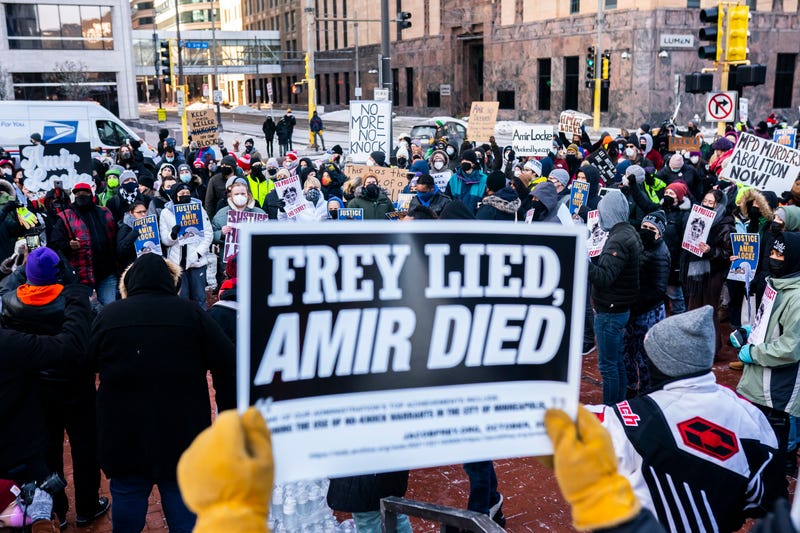
It all began in the early morning hours of January 10, 2022.
Security cameras showed a 39-year-old man was shot to death after being robbed outside a music recording studio in St. Paul.
The video also showed two teenagers bolting from the scene, then speeding away in a stolen Mercedes on Interstate 94.
That vehicle turned up on police files as being connected with three armed robberies in the Twin Cities.
The car was traced to the Bolero Flats apartment complex in downtown Minneapolis.
On February 2, two Minneapolis Police Department SWAT teams descended on that building.
The raid came after the MPD requested and obtained controversial no-knock warrants.
A search of an apartment on the 14th floor resulted in no arrests.
Then an apartment on the seventh floor was targeted.
The gunshots from SWAT team members struck 22-year-old Amir Locke, who was sleeping on a couch under a blanket but was NOT the target of the search.
Video shows when Locke rolls over, he's holding a gun that was legally registered in his name, pointed at the floor, his finger not on the trigger.
While police arrest two others in the apartment, Locke dies from the gunshot wounds.
Once again, Minneapolis is shaken by the death of a black man at the hands of police. Again, police procedure was at the heart of the situation.
No knock warrants means just that; police enter a room without announcing their presence.
Its purpose is to protect officers from a perceived threat, allowing the execution of the warrant.
"My son didn't deserve it, the rest of the Black males across this city and across this nation didn't deserve it," said Karen Locke, Amir's mother. "My son's going to be that face and that voice of those that can't speak. We are going to make sure that we speak loudly for Amir. He will get justice."
Two months after the shooting, on April 6, Hennepin County officials revealed charges would not be filed in the case
"This death is a tragedy and was not necessary," said Hennepin County attorney Mike Freeman "But we are honor-bound on our ethical rules only to charge cases in which there's sufficient, admissable evidence to prove beyond a reasonable doubt and we believe it's there. To charge a case like this would simply be wrong."
But that wasn't good enough for some,with protesters once again taking to the streets around Minneapolis.
The incident sparked debate over controversial police procedures.
"We can make reform in the area of criminal justice reform, we can make reform in the area of no-knock warrants, police procedure, there's still a viable civil matter here," said Minnesota Attorney General Keith Ellison. "There are a number of things a community can and should do to carry forward."
There was also movement at the state capitol on no-knock warrants
"I certainly don't have the authority to do it myself," said Gov. Walz. "But I think, with the legislature, we're hearing voices now that were silent on this. I'm sorry it took this tragedym, but there are voices now saying, across the political spectrum, that these are dangerous."
Minneapolis mayor Jacob Frey took matters into his own hands not long after the shooting, putting in place a moratorium on no-knock warrants that became policy two months later.
The new regulation also blocked the MPD to act on no-knock warrants requested by other jurisdictions.
Eventually, one of Locke's cousins was arrested in connection with the January 10 homicide.
Many were angered that Locke was first identified in a police press release as a suspect in the original homicide.
He wasn't.
Nor were the two others who were arrested in the Bolero Flats apartment.
It brought back memories of the original report of George Floyd's death, ,that he died after a medical emergency.
There was another connection to the George Floyd death.
The Hennepin County judge who approved the no-knock warrant that led to Amir Clarke's death was Peter Cahill, who presided over the murder trial of Derek Chauvin, the former Minneapolis police officer who was convicted of killing Floyd.
